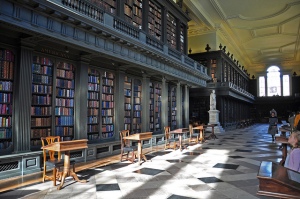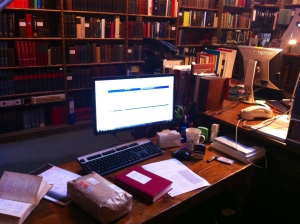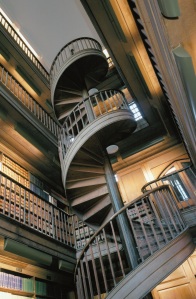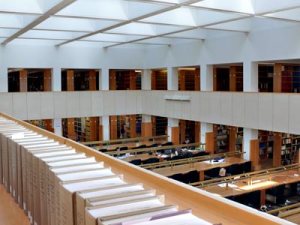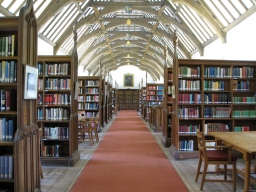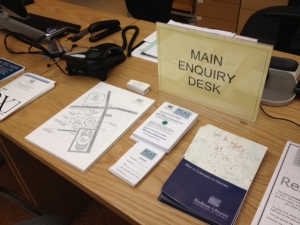Well, better late than never, here is a glimpse of life at St.Hilda’s.
Today the Librarian has taken the 0830 start, so the opening procedures have been undertaken by the time I arrive. In general this involves opening the front door, unlocking any internal doors, closing the Lawyer’s entrance which gives them access outside opening hours, logging-on the OPACs, switching on the printers and photocopier and clearing any mess/items left on desks overnight.
0900 – Check returned books through the library management system. Student invigilators who man the desk after 5pm can accept returns but cannot remove the records from reader accounts.
Separate any books that have been recalled by readers, reserve them and contact them to let them know that they are ready for collection.
0930 – Chat about changes being made to the way we deal with book requests from Graduate students. There is a separate fund for Graduate taught courses and on feedback from the MCR at Library Committee we are attempting to improve and streamline this process.
1000 – Enquire about a book that was returned to us in error. Contact student and set it aside for collection.
Check book repairs that I left to dry overnight. One is satisfactory and ready to find its way home. The other hasn’t quite taken so I try again.
1030 – Student requests: There are a couple of book purchase requests in our recommendation book and e-mail. I check that we don’t already have the books as some students have not checked the catalogue fully before requesting. Check for availability and prices before sending off the request to the subject tutors for approval. Update the spreadsheet where we keep track of what has/hasn’t been approved.
1130 – Arrange the shelving trolleys in shelfmark order, ready for shelving later on.
1200 – Desk duty: My desk is the issue desk so when I am not in the reading rooms I will be issuing/returning books, signing out reserve shelf items, bookstands, giving paper for the printer/photocopier.
Accession some journals: Fill in the index card, add details to accessions spreadsheet, write accession number and shelfmark, stamp with St. Hilda’s logo.
Prepare book to send back to another library.
Receive approval from subject tutor to purchase book. Ring Blackwell’s who don’t have it in stock and as we try to make student requests a priority this book will be ordered from Amazon as it would be quicker than having Blackwell’s order it in from the publisher. Pass on details to the Librarian to order with the credit card.
1300- Lunch: I receive some gentle ribbing about how “orange” my lunch is – roast potatoes, chicken in some unknown sauce, beans and tomato ketchup for luck.
1400-Attempt to check-in a delivery from our suppliers but after much rooting no invoice is to be found. Detective work suggests another box will shortly be arriving.
Shelving journals: Place current subscriptions in their respective Science or Arts/Humanities racks. Shelve the previous issues with the rest of the back issues in the rolling stacks in the basement.
Take this time to give a quick patrol of the library for noise, food and drink, maintenance issues, check the printer cartridge levels and for students leaving unattended items and using up desks. I find a folder with important personal documents, (including a passport!) in a pile of papers next to the recycling bin. Save these and contact the student, who picks them up within 5 minutes. Such is the immediacy of a college library, I will sometimes not even have placed a book on the recall shelf 5 yards away from my chair before the reserver is at the desk to pick it up.
1430 – The subject tutors have all replied and it’s time to order some books. Blackwell’s will send one over the next morning and another will be ordered in and with us early next week. The tutors have asked for extra copies so I order these from our web-based supplier. It takes longer but they come pre-processed.
I create the orders on our library management system and create minimal catalogue records, which will show that these books have been ordered. The Assistant Librarian will make complete catalogue record when they arrive.
1530 – Shelving: As mentioned, no trainee goes without the daily duty. My faithful trolley and I trundle off to put some books to bed.
1615 – Wrapping up: Remove items from the returns trolley so as not to mix them with those to be returned overnight.
Redo some spine labels that have faded or fallen off.
Write this blog post.
1700 – Home time.
